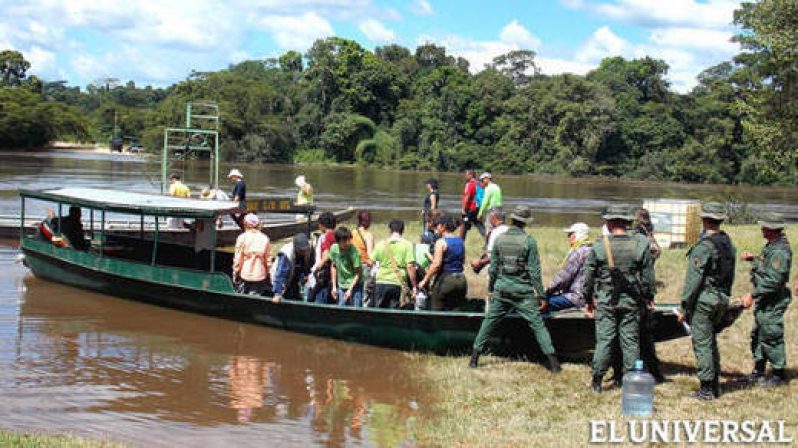THE Venezuelan government, through its embassy in Georgetown, has denied claims that military officers from the Spanish-speaking country opened fire on officials of the Guyana Geology and Mines Commission (GGMC).“The Embassy of the Bolivarian Republic of Venezuela firmly rejects the information reported on Tuesday, May 31st, 2016… that Venezuelan soldiers attacked officials of the Guyana Geology and Mines Commission, who were travelling in a boat in the Cuyuni River, Eteringbang area,” a release from the embassy noted Friday.
Recently, acting GGMC Commissioner Newell Dennison had recounted to the media a report made by the officers who were shot at while conducting a routine monitoring and compliance mission in the vicinity of Eteringbang in the Cuyuni area. Reports reaching this publication suggested that a Guyana Defence Force (GDF) officer had visited the Venezuelan outpost the following day in the area where the incident occurred. The report suggested Venezuelan officers had taken responsibility for firing shots into the air after suspecting the GGMC officials to be smugglers.
Further reports suggested that Venezuela had ordered an investigation into the matter and according to the release from the Venezuelan Embassy, the investigation found that there were no exercises in the area by its military. “This news report lacks validity, since the Venezuelan military forces have not been involved in any incident, as has been falsely reported, let alone confirm the occurrence of violent acts in the mentioned zone, as has been informed,” the release continued.
Commander-in-Chief of Guyana’s armed forces, President David Granger, recently returned from a summit in Cuba, where he shared the space with Venezuelan President Nicolas Maduro. When asked on his ‘Public Interest’ programme whether there had been any dialogue on the matter between him and his Venezuelan counterpart, the President responded in the negative.
Mr Granger said Guyana is not satisfied “that the matter is closed as yet, but it does not seem likely that it will lead to some international conflict.”
The President spared no bones condemning the event in its entirety. “My information is that the rain was falling heavily. There might have been some misunderstanding about the boat that was actually taking the officials, but it is unacceptable in the relations between two States on a river that is owned by Guyana,” Mr Granger said.
Mr Granger confirmed the complaint made by this country to Venezuela, but said there was no response to that complaint. He maintained also that while the issue was not to be seen as a “clash between the two republics”, it is not to say that there was no blame to be had.
Meanwhile, the Venezuelan embassy in Georgetown has said, “The investigations carried out by the Venezuelan military authorities have not reported of any incident in the above-mentioned area and our military units confirm not having carried [out] any military exercise in that location.”
Venezuelan authorities are calling on the Guyana media to “verify all their sources of information and stop echoing the international media campaign against Venezuela.”
This incident is not an isolated one, but forms part of broader relations between Guyana and its Spanish neighbour. Immediately following the change of administration in 2015, Venezuela’s President had issued a decree extending claims to Guyana’s maritime space, inclusive of the Stabroek bloc, where ExxonMobil has discovered oil.
That decree renewed a century-old claim of Guyana’s Spanish-speaking neighbour to land and sea space owned by Guyana which was supported by the decision of an international tribunal in the late 1800s. Venezuela has time and time again renewed its challenge to the arbitral award, which it had initially supported, and even aided in the demarcation of the border between Guyana and its Spanish-speaking neighbour.
Guyana has made it clear that the Good Offices process of mediating the border controversy between the two countries, which began in the 1960s, has run its course. The next best option, according to Guyana’s Foreign Minister Carl Greenidge some time ago, is a juridical settlement by the International Court of Justice (ICJ) with the assistance of the United Nations (UN).



.jpg)








